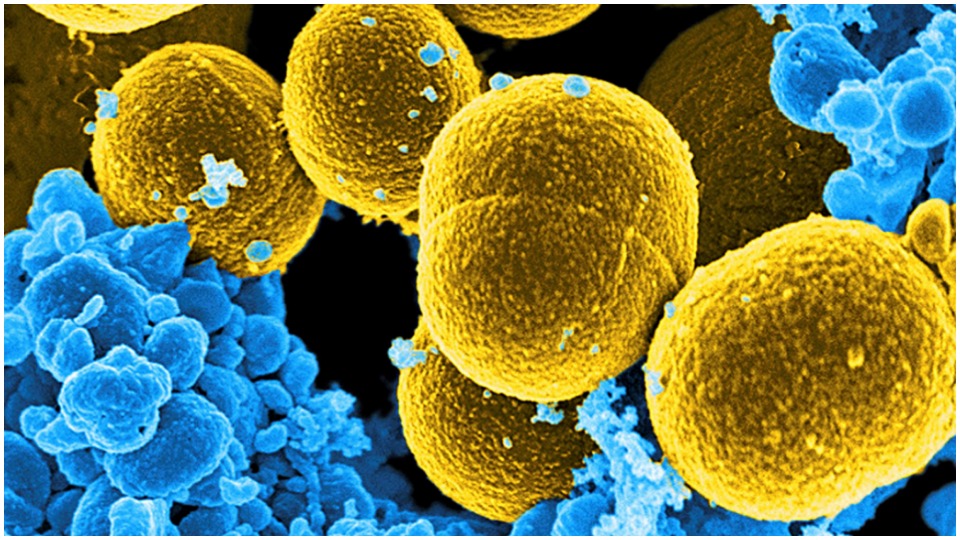
Bacteria are everywhere on the Earth, including inside our own bodies. While most of these bacteria are harmless, sometimes they can cause life-threatening infections.
Before the 20th century, these infections would often be fatal. However, one of the greatest success stories of modern medicine has been the discovery of antibiotics: chemicals which act to kill bacteria.
Thinking about antibiotics in terms of a “war” between humans and bacteria is a mistake. Many bacteria naturally produce antibiotics to reduce the numbers of other bacterial species. These antibiotics are usually in very low concentrations in the environment, but if they can be successfully synthesized, they can be used as medicine to stop bacterial overgrowths, preventing deaths from such infections.
In the 20th century, pharmaceutical companies ran a great trade in identifying bacterial-killing chemicals in soil, isolating the specific molecule and then devising a process to mass produce it and market it as a medicine.
Usually, they didn’t invent the drugs. The famous story of Alexander Fleming’s discovery of penicillin relied on a natural mold which already produced the compound. Mass production was fuelled by the economic pressure of WWII, resulting in widespread availability and saving thousands of lives instantly—as close to a miracle as one can get in science.
Sadly, this miraculous power has not been used wisely. The problem is that antibiotics aren’t an eternal fix. Nothing stays still in biology. The genomes of bacteria are mutating all the time, continually creating variants of bacteria which are able to resist antibiotics—either by degrading the chemical, pumping it out of their cells faster, or by changing its bacterial target to make the bacteria intrinsically immune.
Most of the time, these mutated cells are less able to survive than the existing bacteria, so they die out. However, the use of antibiotics means that bacteria that are able to survive the treatment are the only ones left. So what you can have left after you use a particular antibiotic is bacteria resistant to that antibiotic, which can then spread to other people. Using antibiotics leads to them becoming less effective.
This problem was recognized at the birth of antibiotics, including by Fleming, who pointed out that antibiotic use could lead to the development of resistant bacteria in his Nobel Prize lecture.
However, since there were lots of different antibiotics in the mid-20th century, the going was good. If a bacteria was resistant to one antibiotic, a different antibiotic could be used instead.
Unfortunately, overuse has disturbed the ecological balance.
Bacteria now are increasingly resistant to multiple antibiotics, and if you’re unlucky enough to be infected with one of these, there may not be an antibiotic left to use.
The antibiotic pipeline has run dry. All of this means that there is a need for new antibiotics for which resistance is not yet widespread.
Many antibiotics are simple and cheap to synthesize once known, but they are expensive to identify and test. Unlike most drugs, they are typically only given for a very short period of time to clear an infection, and there is an increasing awareness that they should be used extremely sparingly. The easy antibiotics are all now known about. This makes developing new antibiotics a very unattractive commercial prospect for pharmaceutical companies.
In the last few weeks, the company Achaogen filed for bankruptcy. They were exclusively devoted to developing new antibiotics, and their failure has had industry experts talking of “market failure”; currently only four pharmaceutical companies are attempting to develop new antibiotics. This has prompted much hand-wringing among capitalists about the “incentives” for companies to develop antibiotics.
According to this argument, massive global companies would be only too glad to invest their research budgets into new antibiotics, as they did in the past, but now can’t be confident of making a profit if they start selling a new drug. Because we are acutely conscious of the need not to overuse new antibiotics, sales would always be low. They therefore choose more obviously profitable ventures: drugs for chronic conditions, or “lifestyle drugs” for minor conditions.
In this narrative, the job of governments is to intervene and correct the market by promising better rewards for developing new antibiotics. And the sky’s the limit for dreaming up these proposals: longer patents, dividends spread over multiple decades, licensing agreements with health services whether the drug is used or not…
This is nonsense. The failure of the market in this situation is because of the fundamental incompatibility between the profit motive and physical reality. Antibiotics may appear to be a unique problem. They are not. Much like fossil fuels, publicly funded science identified ways for companies to sell a quick and easy fix. Antibiotics in the 20th century could only ever be a time-limited scenario, and we’re hitting the limit. Short-term growth always creates problems which the companies have no interest in fixing.
The narrative we are told is that the excesses of capitalism are a necessary price to pay for the wonderful innovation it delivers. Yet this is not true. Capitalism didn’t invent antibiotics or fossil fuels. And in fact, the vast majority of scientific research is publicly funded anyway. The economist Mariana Mazzucato has pointed out that private companies regularly derive huge profits after the public has funded initial research. As she writes, many of the supposed greatest successes of the innovation of private enterprise had their origins in government-funded research.
For example, Google’s original search algorithm was funded by the U.S. National Science Foundation, yet now Google uses complex—but entirely legal—international tax arrangements to avoid paying back its fair share. When asked about these tricks in 2012, founder Eric Schmidt said: “I am very proud…. It’s called capitalism.”
The story is nothing new: socialized costs, privatized profits. Society pays for the universities, the salaries of the scientists, and the large research grants that are necessary, without companies investing a penny. But then as soon as research produces knowledge that can be patented, it disappears down pharmaceutical pipelines.
The drying up of new antibiotics because companies now no longer see this as profitable highlights this usually well-hidden scandal.
It doesn’t have to be this way. Many scientists, including those who wouldn’t describe themselves as socialists, are realizing that capitalism has failed for developing new antibiotics.
One proposal outlined recently by researchers in the U.K. is for an internationally, cross-government funded research institute to tackle the problem. The public would not only fund the research but the whole process through to the point of use.
As the authors put it: “The public is already paying for antibiotic R&D [research and development]. Why shouldn’t it own the pipeline, too?”
We wholeheartedly agree; and not just for antibiotics.
Morning Star












Comments